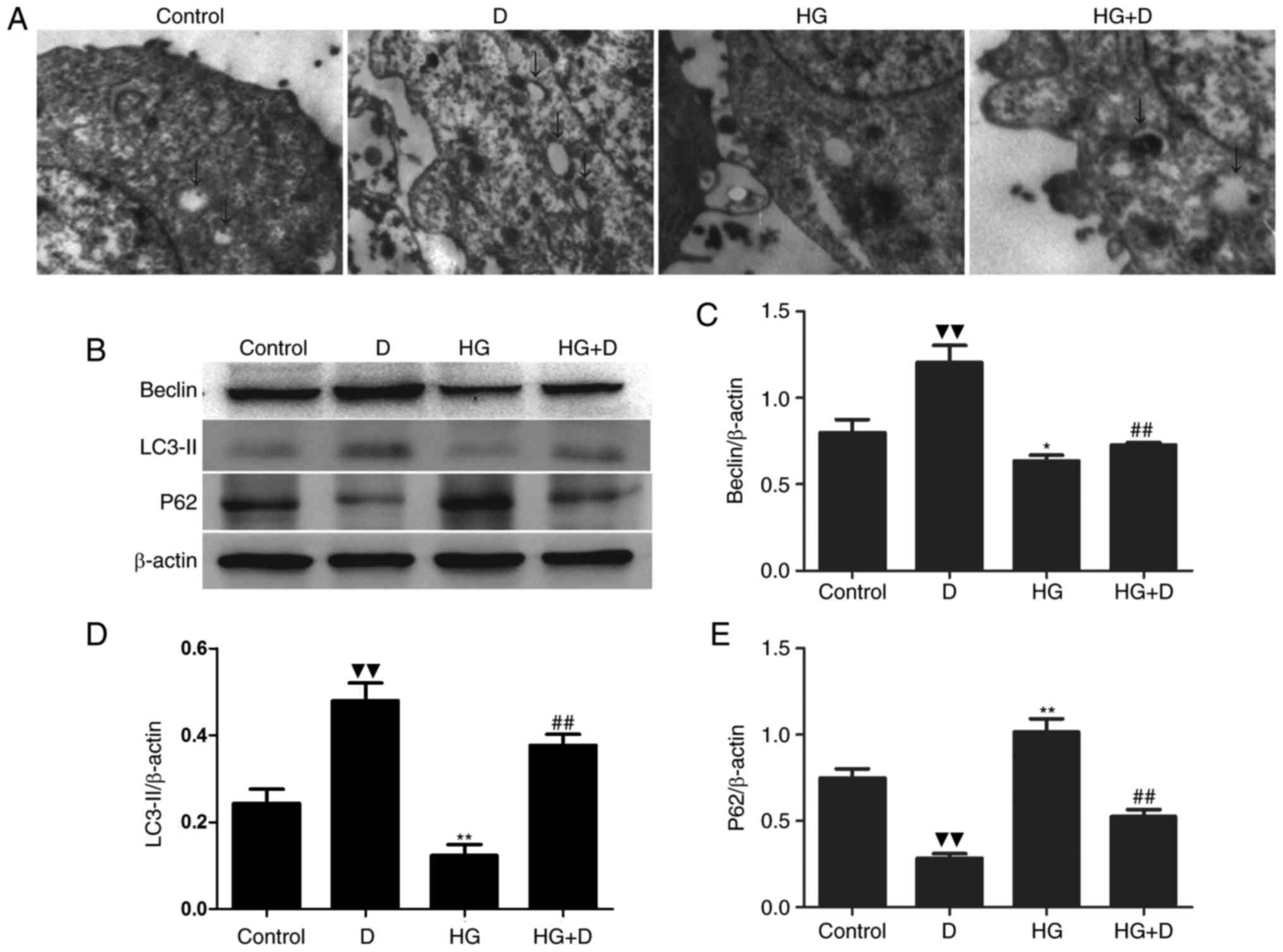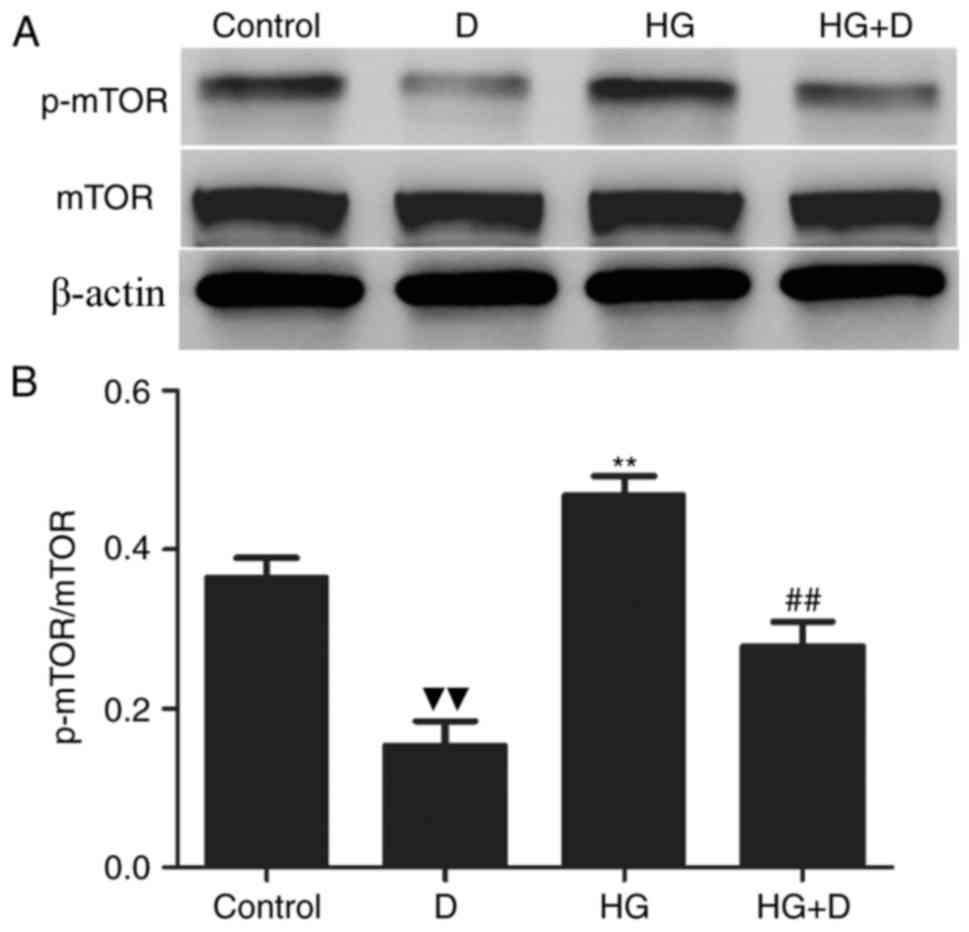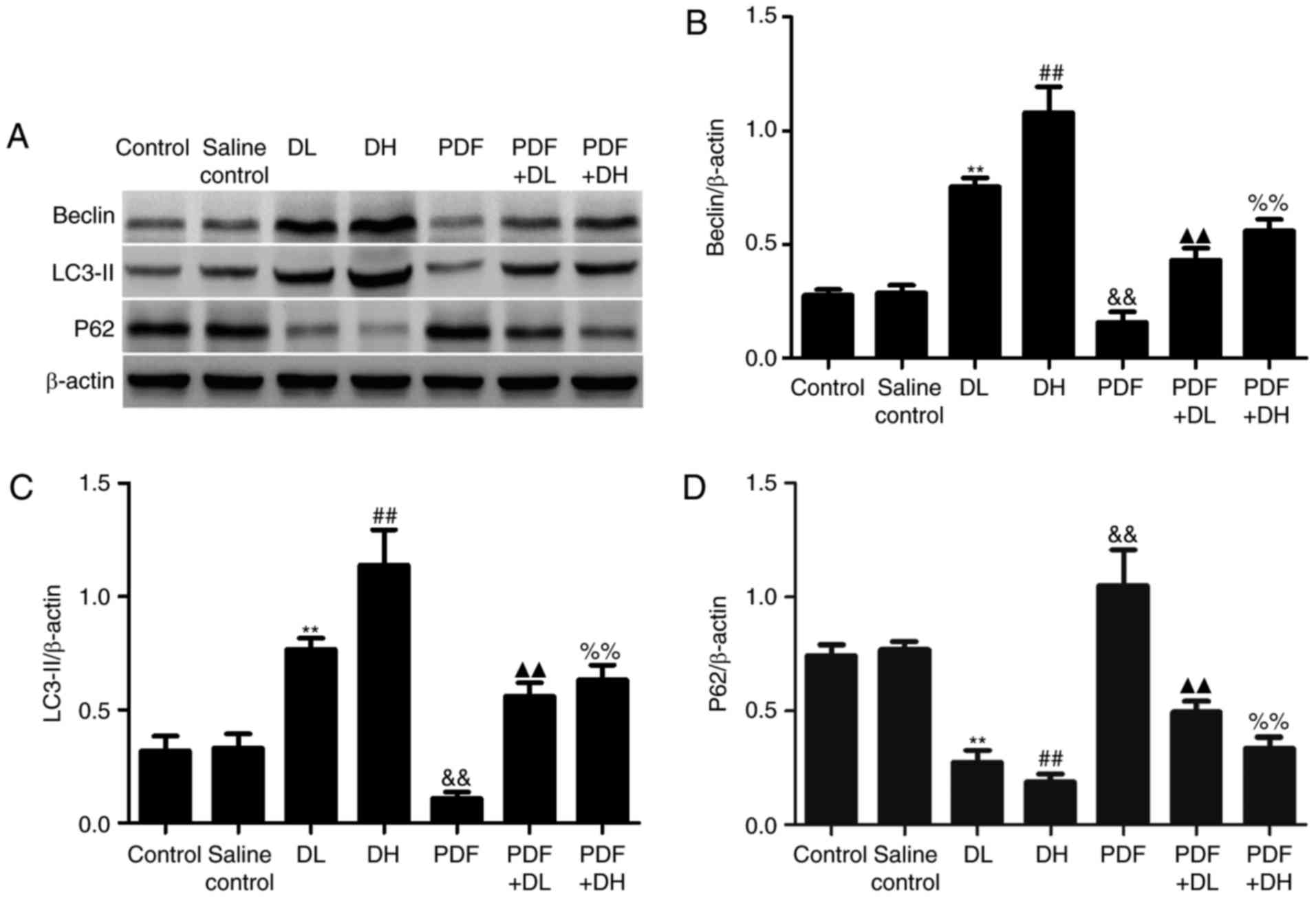|
1
|
Yang L, Wu L, Du S, Hu Y, Fan Y and Ma J:
1,25(OH)2D3 inhibit high glucose-induced apoptosis and ROS
production in human peritoneal mesothelial cells via the MAPK/P38
pathway. Mol Med Rep. 14:839–844. 2016. View Article : Google Scholar : PubMed/NCBI
|
|
2
|
Zhang X, Wang J, Fan Y, Yang L, Wang L and
Ma J: Zinc supplementation attenuates high glucose-induced
epithelial-to-mesenchymal transition of peritoneal mesothelial
cells. Biol Trace Elem Res. 150:229–235. 2012. View Article : Google Scholar : PubMed/NCBI
|
|
3
|
Kanasaki K, Taduri G and Koya D: Diabetic
nephropathy: The role of inflammation in fibroblast activation and
kidney fibrosis. Front Endocrinol (Lausanne). 4:72013.PubMed/NCBI
|
|
4
|
Zhang C, Hou B, Yu S, Chen Q, Zhang N and
Li H: HGF alleviates high glucose-induced injury in podocytes by
GSK3β inhibition and autophagy restoration. Biochim Biophys Acta.
1863:2690–2699. 2016. View Article : Google Scholar : PubMed/NCBI
|
|
5
|
Zhang PW, Tian C, Xu FY, Chen Z, Burnside
R, Yi WJ, Xiang SY, Xie X, Wu NN, Yang H, et al: Green tea
polyphenols alleviate autophagy inhibition induced by high glucose
in endothelial cells. Biomed Environ Sci. 29:524–528.
2016.PubMed/NCBI
|
|
6
|
de Faria JM Lopes, Duarte DA, Montemurro
C, Papadimitriou A, Consonni SR and de Faria JB Lopes: Defective
autophagy in diabetic retinopathy. Invest Ophthalmol Vis Sci.
57:4356–4366. 2016. View Article : Google Scholar : PubMed/NCBI
|
|
7
|
Klionsky DJ and Emr SD: Autophagy as a
regulated pathway of cellular degradation. Science. 290:1717–1721.
2000. View Article : Google Scholar : PubMed/NCBI
|
|
8
|
Chang TC, Hsu MF and Wu KK: High glucose
induces bone marrow-derived mesenchymal stem cell senescence by
upregulating autophagy. PLoS One. 10:e01265372015. View Article : Google Scholar : PubMed/NCBI
|
|
9
|
Lu X, Fan Q, Xu L, Li L, Yue Y, Xu Y, Su
Y, Zhang D and Wang L: Ursolic acid attenuates diabetic mesangial
cell injury through the up-regulation of autophagy via
miRNA-21/PTEN/Akt/mTOR suppression. PLoS One. 10:e01174002015.
View Article : Google Scholar : PubMed/NCBI
|
|
10
|
Wei M, Li Z and Yang Z: Crosstalk between
protective autophagy and NF-κB signal in high glucose-induced
podocytes. Mol Cell Biochem. 394:261–273. 2014. View Article : Google Scholar : PubMed/NCBI
|
|
11
|
Xie Z and Klionsky DJ: Autophagosome
formation: Core machinery and adaptations. Nat Cell Biol.
9:1102–1109. 2007. View Article : Google Scholar : PubMed/NCBI
|
|
12
|
Ohsumi Y: Molecular dissection of
autophagy: Two ubiquitin-like systems. Nat Rev Mol Cell Biol.
2:211–216. 2001. View
Article : Google Scholar : PubMed/NCBI
|
|
13
|
Suzuki K, Kirisako T, Kamada Y, Mizushima
N, Noda T and Ohsumi Y: The pre-autophagosomal structure organized
by concerted functions of APG genes is essential for autophagosome
formation. EMBO J. 20:5971–5981. 2001. View Article : Google Scholar : PubMed/NCBI
|
|
14
|
Jiang M, Liu K, Luo J and Dong Z:
Autophagy is a renoprotective mechanism during in vitro hypoxia and
in vivo ischemia-reperfusion injury. Am J Pathol. 176:1181–1192.
2010. View Article : Google Scholar : PubMed/NCBI
|
|
15
|
Yang PM, Liu YL, Lin YC, Shun CT, Wu MS
and Chen CC: Inhibition of autophagy enhances anticancer effects of
atorvastatin in digestive malignancies. Cancer Res. 70:7699–7709.
2010. View Article : Google Scholar : PubMed/NCBI
|
|
16
|
Degenhardt K, Mathew R, Beaudoin B, Bray
K, Anderson D, Chen G, Mukherjee C, Shi Y, Gélinas C, Fan Y, et al:
Autophagy promotes tumor cell survival and restricts necrosis,
inflammation, and tumorigenesis. Cancer Cell. 10:51–64. 2006.
View Article : Google Scholar : PubMed/NCBI
|
|
17
|
Catalano M, D'Alessandro G, Lepore F,
Corazzari M, Caldarola S, Valacca C, Faienza F, Esposito V,
Limatola C, Cecconi F and Di Bartolomeo S: Autophagy induction
impairs migration and invasion by reversing EMT in glioblastoma
cells. Mol Oncol. 9:1612–1625. 2015. View Article : Google Scholar : PubMed/NCBI
|
|
18
|
Ding YH, Zhou ZW, Ha CF, Zhang XY, Pan ST,
He ZX, Edelman JL, Wang D, Yang YX, Zhang X, et al: Alisertib, an
Aurora kinase A inhibitor, induces apoptosis and autophagy but
inhibits epithelial to mesenchymal transition in human epithelial
ovarian cancer cells. Drug Des Devel Ther. 9:425–464.
2015.PubMed/NCBI
|
|
19
|
Gocek E, Kiełbiński M, Wyłób P, Kutner A
and Marcinkowska E: Side-chain modified vitamin D analogs induce
rapid accumulation of VDR in the cell nuclei proportionately to
their differentiation-inducing potential. Steroids. 73:1359–1366.
2008. View Article : Google Scholar : PubMed/NCBI
|
|
20
|
Foroozanfard F, Jamilian M, Bahmani F,
Talaee R, Talaee N, Hashemi T, Nasri K, Asemi Z and Esmaillzadeh A:
Calcium plus vitamin D supplementation influences biomarkers of
inflammation and oxidative stress in overweight and vitamin
D-deficient women with polycystic ovary syndrome: A randomized
double-blind placebo-controlled clinical trial. Clin Endocrinol
(Oxf). 83:888–894. 2015. View Article : Google Scholar : PubMed/NCBI
|
|
21
|
Fischer KD and Agrawal DK: Vitamin D
regulating TGF-β induced epithelial-mesenchymal transition. Respir
Res. 15:1462014. View Article : Google Scholar : PubMed/NCBI
|
|
22
|
Yuk JM, Shin DM, Lee HM, Yang CS, Jin HS,
Kim KK, Lee ZW, Lee SH, Kim JM and Jo EK: Vitamin D3 induces
autophagy in human monocytes/macrophages via cathelicidin. Cell
Host Microbe. 6:231–243. 2009. View Article : Google Scholar : PubMed/NCBI
|
|
23
|
Uberti F, Morsanuto V, Bardelli C and
Molinari C: Protective effects of 1α,25-dihydroxyvitamin D3 on
cultured neural cells exposed to catalytic iron. Physiol Rep.
4:e127692016. View Article : Google Scholar : PubMed/NCBI
|
|
24
|
Lawrence DW and Sharma B: A review of the
neuroprotective role of vitamin D in traumatic brain injury with
implications for supplementation post-concussion. Brain Inj.
30:960–968. 2016. View Article : Google Scholar : PubMed/NCBI
|
|
25
|
Yang L, Ma J, Zhang X, Fan Y and Wang L:
Protective role of the vitamin D receptor. Cell Immunol.
279:160–166. 2012. View Article : Google Scholar : PubMed/NCBI
|
|
26
|
Lodder J, Denaës T, Chobert MN, Wan J,
El-Benna J, Pawlotsky JM, Lotersztajn S and Teixeira-Clerc F:
Macrophage autophagy protects against liver fibrosis in mice.
Autophagy. 11:1280–1292. 2015. View Article : Google Scholar : PubMed/NCBI
|
|
27
|
Xie Z, Lau K, Eby B, Lozano P, He C,
Pennington B, Li H, Rathi S, Dong Y, Tian R, et al: Improvement of
cardiac functions by chronic metformin treatment is associated with
enhanced cardiac autophagy in diabetic OVE26 mice. Diabetes.
60:1770–1778. 2011. View Article : Google Scholar : PubMed/NCBI
|
|
28
|
Chen F, Chen B, Xiao FQ, Wu YT, Wang RH,
Sun ZW, Fu GS, Mou Y, Tao W, Hu XS and Hu SJ: Autophagy protects
against senescence and apoptosis via the RAS-mitochondria in
high-glucose-induced endothelial cells. Cell Physiol Biochem.
33:1058–1074. 2014. View Article : Google Scholar : PubMed/NCBI
|
|
29
|
Zhu L, Kong M, Han YP, Bai L, Zhang X,
Chen Y, Zheng S, Yuan H and Duan Z: Spontaneous liver fibrosis
induced by long term dietary vitamin D deficiency in adult mice is
related to chronic inflammation and enhanced apoptosis. Can J
Physiol Pharmacol. 93:385–394. 2015. View Article : Google Scholar : PubMed/NCBI
|
|
30
|
Greń A: Effects of vitamin EC and D
supplementation on inflammation and oxidative stress in
streptozotocin-induced diabetic mice. Int J Vitam Nutr Res.
83:168–175. 2013. View Article : Google Scholar : PubMed/NCBI
|
|
31
|
Høyer-Hansen M, Bastholm L, Mathiasen IS,
Elling F and Jäättelä M: Vitamin D analog EB1089 triggers dramatic
lysosomal changes and Beclin 1-mediated autophagic cell death. Cell
Death Differ. 12:1297–1309. 2005. View Article : Google Scholar : PubMed/NCBI
|
|
32
|
Demasters G, Di X, Newsham I, Shiu R and
Gewirtz DA: Potentiation of radiation sensitivity in breast tumor
cells by the vitamin D3 analogue, EB 1089, through promotion of
autophagy and interference with proliferative recovery. Mol Cancer
Ther. 5:2786–2797. 2006. View Article : Google Scholar : PubMed/NCBI
|
|
33
|
Wang J, Lian H, Zhao Y, Kauss MA and
Spindel S: Vitamin D3 induces autophagy of human myeloid leukemia
cells. J Biol Chem. 283:25596–25605. 2008. View Article : Google Scholar : PubMed/NCBI
|
|
34
|
Zhang X, Howell GM, Guo L, Collage RD,
Loughran PA, Zuckerbraun BS and Rosengart MR: CaMKIV-dependent
preservation of mTOR expression is required for autophagy during
lipopolysaccharide-induced inflammation and acute kidney injury. J
Immunol. 193:2405–2415. 2014. View Article : Google Scholar : PubMed/NCBI
|
|
35
|
Yang Z, Liu F, Qu H, Wang H, Xiao X and
Deng H: 1, 25(OH)2D3 protects β cell against high glucose-induced
apoptosis through mTOR suppressing. Mol Cell Endocrinol.
414:111–119. 2015. View Article : Google Scholar : PubMed/NCBI
|
|
36
|
Jang W, Kim HJ, Li H, Jo KD, Lee MK, Song
SH and Yang HO: 1,25-Dyhydroxyvitamin D3 attenuates
rotenone-induced neurotoxicity in SH-SY5Y cells through induction
of autophagy. Biochem Biophys Res Commun. 451:142–147. 2014.
View Article : Google Scholar : PubMed/NCBI
|

















